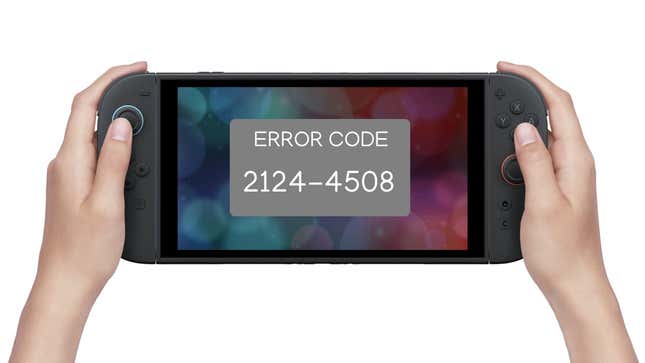
Nintendo has become increasingly draconian in its efforts to prevent piracy, most recently adding words to its EULA that claim it has the right to brick your console if it doesn’t like what you use it for. And following the release of the Switch 2, the Japanese company isn’t holding back: many new console owners have reported they’re unable to use any online functions after Nintendo detected them attempting to use MiG carts. Now, it seems some users who’ve triggered this block are selling their broken consoles to unsuspecting buyers.
As spotted by Android Authority, a Reddit poster bought themselves a pre-owned Switch 2 from a Walmart store, only to find it had been previously incapacitated by Nintendo.
“I was driving between work sites and stopped at two different Walmarts,” says user Bimmytung. “At the second one I find a Mario Kart edition sitting in the case and couldn’t believe my luck.” They were informed by the Walmart staff that it was an “open box return,” so it was removed from the box to be checked over, and all looked well. The code for the packaged Mario Kart World had been scratched off already, so Walmart knocked another $50 off the price, and it all seemed like a good deal. Until they got home.
Finally after work I get a chance to set it up. Quickly realize I need the super special micro SD card and none of the ~half dozen in the house would work. Drive ten minutes to Target and get one there and pick up a few other accessories as well. Get home and go to finish the setup—quickly get Error Code 2124-4508. A quick Google search shows me I’m screwed. FML.
Because they’d bought it from Walmart, it wasn’t a problem to return the console and get their money back. But of course this meant they were still without the desired Switch 2. And bear in mind, this was an inspected item, which unless someone tried to use for any online functionality (not exactly simple in a store, given you’d need to access wifi, etc), would look like a fully functioning console.
Now imagine this transaction had taken place over eBay or any other online store. It’d be the buyer’s word against the seller’s over who had caused the infraction, and extremely difficult to settle. And given the widespread reports of the already infamous Error Code 2124-4508, it’s going to make buying a secondhand Switch 2 extremely difficult.
MiG carts became a popular means of piracy on the Switch 1 for those who didn’t want to attempt jailbreaking the device. It’s a cartridge the size and shape of a regular Switch cart, but writable via SD card on your PC, allowing you to load a single game onto the cart at a time. Nintendo has tried to fiercely crack down on those who sell the MiG, but since the release of the Switch 2, an update has been released that allows it to take advantage of the device’s backward compatibility and still play Switch 1 games.
However, Nintendo appeared to be ready for this, with the Switch 2 seemingly able to detect its use and bricking its own online abilities when it does so—something that’s more dramatic than it might sound, given how few games will actually be on carts for the new handheld. It means you can’t download the games, use the stores, play multiplayer, update software, or run those irritating checks to see if you’re “allowed” to play a game if you share an account over more than one console. It’s pretty fundamental.
This, of course, comes with the added complexity that there are completely legitimate uses of a MiG cart, such as running homebrew games that aren’t copyrighted in the first place. I expect this means there will have to be a court case over this feature at some point soon.
However, the more immediate issue is for those looking to pick up a Switch 2 from a reseller or previous owner, given their current scarcity at first-party sellers. There’s really no way of knowing at all if a console has been bricked when buying the device online, and this could make the resale market a complete shambles for the whole life cycle of the console. And, grimly, that’s not exactly a priority for Nintendo, given that reselling, either in store or online, gains the company nothing, and some would argue actually costs the company a sale—it’s not like it’ll be in a rush to address the problem.
.